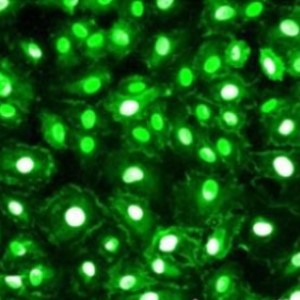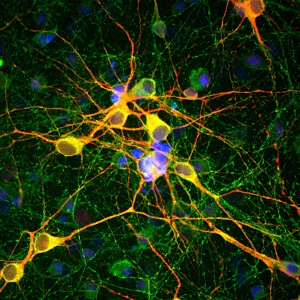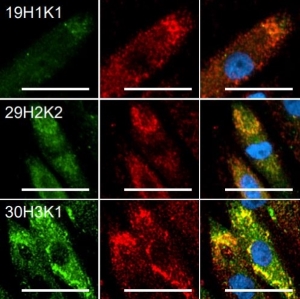- Products
- Customer Publications
- Back
- Customer Publications
- Publications Using Our Human Primary Cells, iPSC Derived Cells & Cell Lines
- Publications Using Our Fetal Bovine Serum (FBS) & Other Sera
- Publications Using Our Defined Media & Culturing Tools
- Publications Using IBA Lifesciences Products
- Publications Using Our 3D in vivo Like Models
- Publications Using Our Antibodies
- Publications Using Our Proteins, Growth Factors & Enzymes
- Publications Using Our Vectors & Transfection Kits
- Protocols
- Testimonials
- Ordering Info & Policy
- Blog
- Back
- Blog
- Exciting Spinal Cord Injury Research
- Tumor Microenvironment Research Demands Our CAFs
- Cancer & Pain Intersect with Our Schwann Cells
- Surgical Imaging Research With Our Brain Cancer Cells
- Easy-To-Use RNase Inactivating Reagent
- Study the Tumor Microenvironment with Our CAFs
- Introducing Cas9 Expressing Primary Cells & GPCR Expressing Cell Lines
- Study Pain & Neuroscience with Our Antibodies
- 3D Bioprinting With Neuromics ISOKine Proteins
- More Diabetes Research With Our Endothelial Cells
- Impactful Neurodegenerative Disease Research
- Great Pricing on Reliable Human Cells
- CAFs Used in Groundbreaking Research
- FBS for $199/500 ml - Order Today
- Save 15% on All Human Cells - One Final Month
- Exciting Research Using Our HBMECs
- GFP Brain Cells in Surgery Research
- Save on IBA's Newest Resin This November
- Reliable Human Cell Lines
- More GFP-HUVECs Research
- Continue to Save on Neuromics Human Cells
- Don't Forget About Our GFP Expressing Cells
- Alzheimer's Research with Our 3D BBB Model
- Our Immortalized CAFs in Action
- Save Big on Human Cells to End The Year
- Rely On Our FBS For Fall Research
- Even More iPSC Brain Cells
- More Immortalized CAF Types
- IBA's New Protein Purification Resin
- Another Round of New iPSC Brain Cells
- Human Brain Cells That Make Discoveries
- Our HRMECs Enable Diabetes Research
- Save on Preferred FBS This Spring
- New Medias for Neurite Outgrowth & Tube Formation
- Cancer Associated Fibroblasts (CAFs) That Deliver
- More Research Releases Using Our Bio-Reagents
- Our FBS Continues to Impress
- Neuromics Products in Parkinson's Disease Research
- iPSC Brain Cells Available Today
- Introducing AlphaBioCoat Precoated Products
- End 2023 with FBS Savings
- Reliable FBS Makes Everything Easier
- More Blood-Brain Barrier Research
- Neuromics Primary Brain Cells in BBB Research
- Long COVID Research Uses Our Human Brain Cells
- Our Products Crush Pain & Cancer Research
- Study T-Cells with Our Peptides
- Endless Antibody Applications
- Versatile FBS Options
- Our HBMECs Used in Hypertension Research
- Welcoming Microglia to the Club
- Introducing More Cancer Associated Fibroblasts (CAFs)
- Another Pain Antibody Pub
- So Much FBS News to Share
- BBB Organoids Grown Using Neuromics Cells
- Research Proven Transfection Kits
- Pain Antibodies With 20+ Years of Proven Results
- Our Preferred FBS Is Back in Stock
- Two New FBS Publications to Share
- Fresh Antibodies for Fall Research
- New Research Using Our Human Brain Astrocytes
- More Savings This August
- Our Primary Human Neurons Enable Discoveries
- Save on FBS This July
- Another New Cell Type
- Free Shipping On FBS Through May
- A Number of Versatile Research Tools
- New Fibroblasts To Complement Our CAFs
- 5% Off Premium FBS Through the End of March
- A Collection of Products for Cancer Researchers
- Our Neurons Help Investigate the COVID-19 Virus
- Neuromics HBMECs and FBS Need More Attention
- So Many Reagents for Neuroscientists
- The Complete Set of Human Prostate Cancer Cell Lines
- Neuromics FBS Wins on Quality & Price
- Introducing Preferred FBS From Neuromics
- Out of Matrigel? Check Out Our Collagel Hydrogels
- Save on Antibodies While They Last
- Neuromics Brain Endothelial Cells Strike Again
- A Great Cell Line for Prostate Cancer Research
- Save This Month on Human Cells
- Our Antibodies Are Crushing Neuroscience Research
- Congrats to SSFC on a Great Season
- Neuromics HRMECs Prove Their Consistency
- Our Reagents are Helping Answer Questions About COVID-19
- New Peptides for COVID-19 Research
- Welcome to July... And FBS Savings!
- New Fibroblast Cells and More Research
- Study SARS-CoV2 and More with Our 3D BBB Model
- It's Summer: Save on Antibodies
- Neuromics Cells and Diabetes Research
- FBS and Serum June Update
- SSFC Has Started Off Strong
- FBS and Serum May Update
- New Brain Cancer Cells
- Our Sunflower's Are Back in Action
- Neuromics FBS and Cancer Research
- Our Tuj-1 Antibody Is the Real Deal
- The Sunflower's are Doing Awesome Things
- Neuromics Colorectal Tumor CAFs Are Helping Us Understand Cancer
- Neuromics is Celebrating Brain Awareness Week
- An Explanation of Our FBS Products
- FBS Still on Sale
- Our Human Endothelial Cells Are Elite
- Culture ALL Cell Types with Our FBS
- Premium Imported FBS Only $299!
- You'll Love Our Pericytes and Astrocytes
- Our Human Schwann Cells Walk the Talk
- Neuromics and Sunflower State FC
- Neuromics' Cells Used in COVID-19 Research
- New ACE2-GFP Human Cells
- Neuromics’ Colorectal Tumor and Pancreatic-Stellate Cell CAFs in Action
- Neuromics FBS Used in New Neurodegenerative Research
- New Publication Using Our Transfection Kit
- Save on Chicken Serum with Neuromics
- New Human Brain Cells
- COVID-19 is passing through the Blood-Brain Barrier!
- New PGP 9.5 Publications
- GFAP Publications
- More New Antibodies
- Save On Our FBS
- Calbindin Antibodies
- Blood-Brain Barrier Publication
- Lung Cancer Associated Fibroblasts Publications
- New Tumor Cells
- Blood-Brain Barrier Antibodies
- New Cluster of Differentiation (CD) Antibodies
- New Antibodies to Explore
- Your Data - Our Products
- Energize Your Cell-Based Assays
- Fibroblast Compression and Tumor Cells Migration
- Human Brain Cells
- Easy Immunostaining Staining
- New Neuronal Markers
- ATP and Pain
- Our Hearing Adapts in Space
- Staning Cells and Tissue
- Markers for Tyrosine Hydroxylase (TH)
- Human Cells in Action
- Neuromics' Fetal Bovine Serum (FBS) Strikes Again
- You'll Love Our FBS
- New Antibodies
- Your Opinion Matters
- May News
- HUVECS in 3-D Action
- Antibodies You Can Trust
- Long-Term Cell Cultures
- ABCA1, ASIC3 and MOR
- National Eye Institute's 3-D ROC Challenge
- April News
- Contact Us
- About Us
- FAQs
- Sign In
Blog Posts






